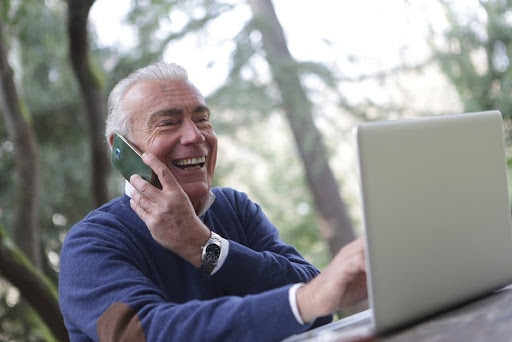Social media continues to ingratiate itself in the daily life of many. From the accessibility of social media through smart devices to the increasing reliance on digital media in both personal and professional life, it can be difficult to escape digital social spaces.
While social media has its benefits for many people, it also comes with its own stresses and challenges. Managing the use of these social media forums like Facebook, Instagram, TikTok, and more is necessary for each person’s mental and emotional health.
For those in recovery from substance use disorder (SUD), social media can undoubtedly impact sobriety. Understanding the role of social media throughout addiction recovery is necessary to embrace its benefits while mitigating potential dangers. There are always new skills those in recovery can adopt to engage with social media in a safe and positive manner.
The Dangers of Social Media in Addiction Recovery
Social media can present unique stresses for those in recovery. Overcoming addiction and its myriad effects is always a personal journey. Consistent, unhealthy use of social media can further complicate an individual’s recovery efforts in addition to their mental health.
Unhealthy Comparisons
Social media can cause an individual to develop unhealthy and unfair comparisons to peers. It is common to see posts from peers living their lives and feel as if their own is somehow “inadequate” or “lesser” than another’s, bringing intense feelings of self-doubt, depression, and more.
However, not only are these posts curated to garner such a reaction rather than necessarily project the truth, but these comparisons also ignore other important factors. No two people will navigate life in the exact same way, and judging oneself by another’s metric is wholly unfair, compromising otherwise hard-earned feelings of pride and the genuinely amazing strides made in each person’s addiction recovery.
Glorified Portrayals of Substance Use
Social media can also create mixed messages about the use of addictive substances. It is common to see the use of drugs or alcohol romanticized throughout social media, with engaging with these substances being seen as something that is celebrated. This perspective is entirely discordant with a person’s recovery efforts and goals, creating conflicting thoughts and causing those in addiction recovery to question their dedication to a sober life. Romanticizing the use of drugs or alcohol is incredibly dangerous and can cause an individual to lose sight of the destructive nature of these substances through this dangerous lens.
Social Media Addiction
Lastly, social media addiction can be wholly detrimental to a person’s life. Constant engagement with social media platforms can bring intense feelings of shame, guilt, or insecurity if an individual feels constantly judged by digital peers. Practices like “doomscrolling” can also greatly impact emotional health, with regular exposure to a deluge of negative news stories informing an individual’s perspective and mood in daily life.
The Benefits of Social Media in Addiction Recovery
While social media can be actively detrimental if not managed properly, it can have benefits for those in recovery. Being able to connect with support even when they are not physically present is an invaluable recovery tool, further nurturing these relationships and providing an outlet in the face of stress or other challenges.
Regular contact with family, friends, and others working to manage their own sobriety is crucial. Employing dedicated skills to manage social media in recovery can ensure that each individual can make the most of their digital devices and their recovery advantages while preventing the negative effects of social media use.
Managing the Use of Social Media
Making the most of social media in addiction recovery is a practiced skill. Incorporating a combination of strategies can ensure that each person’s goals for social media users are always focused and cohesive with their overarching recovery ambitions.
Use Blackout Times
Blackout times are pre-set times when all electronic devices are turned off. For many, these blackout times are situated around mealtimes like dinner, encouraging an individual to engage with family and friends instead of social media. Not only can this ensure that an individual is never spending too much time on social media, but it also reinforces the development of these important, in-person relationships, social skills, and more.
Avoid Use Before Bed
Excessive use of social media can affect other areas of life, including established sleep routines. Turning phones off before bed and avoiding the use of digital devices during nighttime routines is necessary to allow the brain time to relax without these unnecessary stimuli. This can promote a healthier sleep routine and provide the best rest possible for navigating the daily stresses common throughout addiction recovery.
Keep Apps Hidden
Moving social media apps to less readily accessible spaces can inherently limit a person’s exposure to unnecessary stress. Keeping them off of the home page can prevent unplanned or impulsive checking of these media, forcing those in recovery only to check when they have something already in mind that they actively want to do on these sites. Engaging with social media with intention and turning it off once this intention is fulfilled is crucial for managing the use of social media and preventing its negative effects from impacting a person’s mental health or hard-earned sobriety.
Social media can greatly affect your journey in recovery. We at Buena Vista Recovery are prepared to help you navigate its advantages while mitigating its potentially destructive effects. By combining your recovery journey and effective sober practices with life skills and a community of supports, peers, and professionals, we create a recovery-focused atmosphere that addresses the complexities of a sober life. From developing new relationships to strategies to manage the use of social media, your time with us is personalized to fit your needs and goals in sobriety. For more information on how we can help you, or to speak to a caring staff member about the options available to you, call us today at (480) 741-9414 or complete the insurance verification form here.





